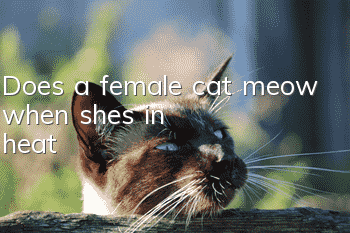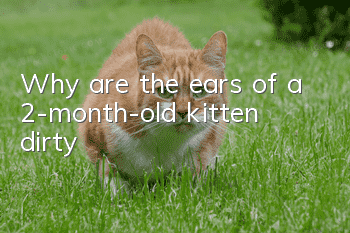What are the common diseases and symptoms of Siamese cats?

Siamese cats, like humans, will suffer from some diseases, such as some common diseases, influenza, enteritis, etc. How to treat these problems?
Siamese Cat
Flu
Influenza is a viral disease that is usually spread by contact between cats. Antibiotics have no effect on viruses, so the usual treatment method is to reduce the cat’s clinical symptoms as much as possible and improve the cat’s own resistance through nutritionally balanced food to protect the cat’s life until the cat recovers naturally. But there is a way to prevent it - vaccination, which can deal with the flu.
Symptoms of cats suffering from this disease are severe colds and may also cause ulcers on the surface of the eyes or inside the mouth. Cats rely on their sense of smell to arouse their appetite. Influenza can cause a loss of smell, resulting in a reduction in the cat’s food intake. Some cats never recover and become chronic flu sufferers or "snuffies." Kittens are often the worst victims and will die without careful care. To help protect against this disease, kittens need to be vaccinated, and adult cats need an annual booster shot.
Enteritis
This disease is very dangerous, especially for young cats. Symptoms of this disease include lethargy, loss of appetite, vomiting, dehydration and diarrhea. If a female cat is infected with this disease during pregnancy, her kittens will have symptoms of neurological damage. Enteritis viruses can persist for up to a year under certain circumstances. Like the flu. Cats that recover can become carriers of enteritis virus. In addition, kittens need to be vaccinated against enteritis as required by a professional doctor, while adult cats need to receive a booster shot once a year.
Parasite
Prevention: Fleas and ticks are two of the more common parasites in cats. They are usually infected through an unclean living environment or contact with other small animals infected with fleas. Once infected, it will cause other types of diseases and cause serious consequences. To prevent it, always bathe the cat with a suitable shampoo to get good results. At the same time, it also keeps the cat’s living environment clean and hygienic.
Deworming: If you find lice on your cat, but the cat has no obvious symptoms, you should remove the lice and closely observe the cat's behavior in the next few days. If symptoms such as coughing, vomiting, abnormal voice, or abnormal gait occur, the cat should be taken to the hospital immediately.
Oral and Teeth
Losing teeth makes it difficult to chew, so food must be made easier for it to eat. Thick dental calculus makes teeth easy to loosen and fall out, and even injure the inside of the mouth.wall, forming ulcers. And dental calculus is more likely to cause periodontal inflammation. Don’t ignore the fact that periodontal inflammation can cause infections throughout the body. Ask your veterinarian to clean up his teeth and remove all rotten teeth. Old cats often lose their appetite due to toothache and oral inflammation.
Constipation
Reduced amount of exercise, reduced appetite, and less liquid water intake, making it easy to cause constipation. Combing it diligently and often can reduce the obstruction of the hair ball. Constipation should not be taken lightly. If it is severe, it will often cause the ileum and rectum to lose their elasticity, causing the feces to be as hard as a large stone pillar and cannot be passed out at all. As a result, the stomach and small intestine cannot move normally, making it easy for loss of appetite, vomiting, and nausea.
Leukemia
Old cats are very susceptible to leukemia and have many symptoms, the most important of which are anemia, loss of appetite, poor posture, poor coat, and weakness. Treatment often only prolongs life, but ultimately fails to completely cure the disease.
Old cats are especially jealous of other animals and even people in the home, so pay as much attention to it as possible to make it feel comfortable. You have had a long and wonderful time together, please continue to make it feel loved and needed.
Diarrhea
Old cats have reduced intestinal digestive capacity and often suffer from diarrhea.
Tumor
It mostly occurs in old cats. You should always pay attention to whether there are any strange things growing inside or outside the cat's body. Early detection can lead to early treatment, and the chance of success is greater.
Anemia
Old cats are more likely to be anemic, and anemia is often caused by other diseases.
Diabetes
It is more common in overweight cats, which makes them have a particularly good appetite. Be thirsty easily, lose weight, and have loose stools. At the same time, its urine can easily attract ants.
Skin diseases
The skin is prone to rashes, knots, etc. Groom it frequently and send it to the pet hospital for prompt treatment if found.
Nervous system
Epilepsy-like convulsions, strokes, paralysis, etc. often occur suddenly, and often occur unilaterally. Sometimes there is no sign of it, so if the old cat is at home, it is best for someone to look after it regularly.
Movement disorders
Muscle incoordination, arthritis, joint swelling and pain.
- Why do cats pee randomly? How to correct this habit?
- Why do cats purr?
- How to prevent toxoplasmosis in tabby cats, toxoplasmosis in dogs and cats and their prevention!
- What does it mean when a cat licks another cat?
- What color are Ragdoll cats’ eyes? Can you tell the difference?
- Why does a female cat get angry at her own kitten?
- How to deal with cat hair loss in spring
- What should you do if your cat is in heat? How to take care of a cat during estrus?
- What should I do if my cat likes to sharpen its claws?
- Is it normal for a cat’s ears to be cool?



